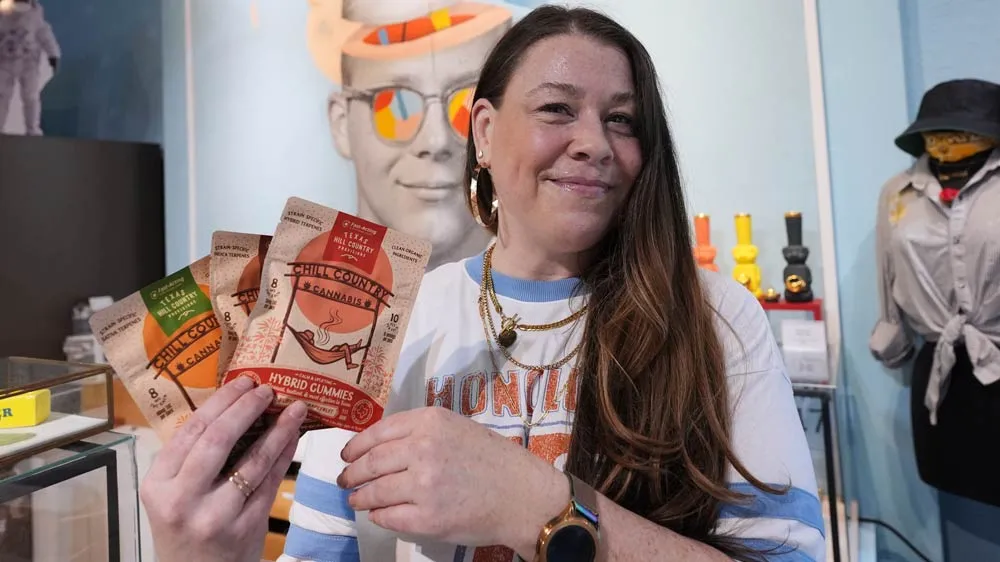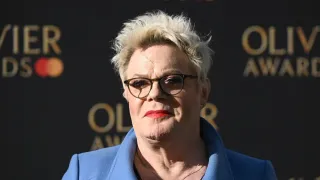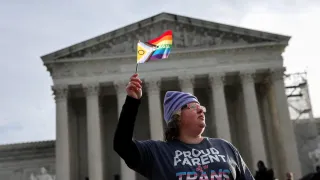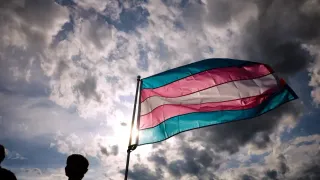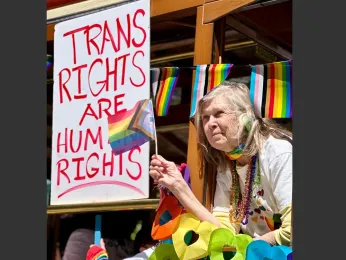
Jun 19
Parents of trans kids find support via SF PFLAG chapter
Matthew S. Bajko READ TIME: 5 MIN.
A Bay Area native and registered nurse, Tali Pinkham had grown up knowing many LGBTQ community members and made close gay friends at college. When the eldest of her three children came out as transgender and nonbinary in their 20s, Pinkham didn’t reject them or question them about doing so.
To her mind, she thought she was being supportive of them. Then, a few years ago, Pinkham learned after the fact that their eldest had gotten top surgery and was taken aback.
“I had my head in the sand. I thought they could be nonbinary and do nothing other than just sort of be,” recalled Pinkham, who is in her 60s and lives in Piedmont. “Then they started really transitioning and now were on hormones. I realized that I wasn’t doing a very good job in terms of supporting them.”
Her younger two children counseled Pinkham to better educate herself about gender dysphoria and what transitioning entails. Her middle daughter gave her a book about being transgender and suggested Pinkham connect with the PFLAG chapter in San Francisco, to which she replied, “What is PFLAG?”
Begun more than 50 years ago by the late Jeanne Manford, whose son Morty was a prominent New York City gay rights activist, the organization aimed to support families and friends of LGBTQ people. Within a few years PFLAG chapters had sprung up across the U.S., and today it also counts LGBTQ individuals among its members.
The San Francisco chapter, for instance, since January has had a gay man as its president, Robert Costic. A lawyer and former Washington, D.C. police officer, he joined the local chapter after moving to the city in June 2021.
Apple had hired his husband, Nate Mueller, prompting the couple’s relocation that Pride Month. Mueller is also on the board of the local chapter, which has a mix of both LGBTQ people and straight allies on it.
“Ironically, my personal preference is for PFLAG to be run more by parents of LGBTQ children. PFLAG is designed for that; it is our bread and butter,” said Costic.
Having first met Mueller and Costic when she lived in D.C., Sandhya Ramakrishnan, 34, joined the chapter in early 2024. The straight ally had moved to San Francisco three years ago for a job in the data analytics sector, and keen to volunteer her time, she joined the board last June.
“I wanted to give back because I felt there was a lot of bias towards the LGBTQ community and trans people,” said Ramakrishnan. “Giving time to a cause is near and dear to my heart.”
Having left Michigan at age 12 to live in Brazil, Ramakrishnan was bullied for being different and later in life felt othered when living in Europe. In college in Virginia, a number of her LGBTQ friends weren’t accepted by their families after coming out.
“It doesn’t make a lot of sense to me, but there is a lot of bias in this world,” said Ramakrishnan.
A good outlet
For those wanting to lessen homophobia and transphobia in their community and better educate themselves about the issues, becoming involved with PFLAG is one outlet to do so, she said.
“For those asking themselves, as an ally, what can I do in this climate? how can I be a better ally in this scary environment? the advice I give is give voice to the people who maybe are scared to speak up,” said Ramakrishnan, explaining that, “I am not saying speak for people but, for example, to give voice in areas where trans people may not have as loud as a voice.”
Three years ago, Pinkham first took advantage of the San Francisco chapter’s support groups run by a trained facilitator in LGBTQ issues. She marched with it in the city’s annual Pride parade, and this past January, joined its board.
“What has made me be more active is probably fear. Literally fear of the erosion of human rights,” Pinkham told the Bay Area Reporter, pointing to the various actions the Trump administration has taken to roll back the rights of LGBTQ individuals, particularly for trans youth and adults.
A main focus for Pinkham has been talking to other parents whose children have come out as trans, nonbinary, or gender-nonconforming. At the same time as their child is transitioning, parents are also on a “very difficult journey” of their own, said Pinkham, that requires saying goodbye to their child’s former self and embracing their new identity, name, and gender.
“It is not just about your relationship with your kid. It is not just about your child’s challenging transition. It is also about your transition,” she said. “You have to come to terms with it. You have to work through the process of grief because your expectations for that child have changed. Your child’s identity is changing before your eyes, you have to work through all of that and through your fears about how life may be more challenging for your child.”
Other than seeing a therapist, Pinkham didn’t find many options to seek such support outside of PFLAG. Through it, she learned about the transitioning process, the right vocabulary to use, and practiced addressing someone with they/them pronouns.
“I gained so much knowledge from them, and also I needed it for support. Because I didn’t have friends or family who are going through the same thing,” said Pinkham, who has since met co-workers with trans family members. “It does help to connect with other parents experiencing some of the same things. I definitely needed that.”
The PFLAG San Francisco chapter has roughly two dozen dues-paying members (it costs $8 a month) and hosts social events anyone looking for connection and community can attend. It also welcomes anyone to take part in its monthly virtual support groups. They take place every second Tuesday and fourth Thursday of the month from 7 to 9 p.m.
“Recently, we have been hearing from more parents of trans children, especially at the beginning of the year after [President Donald] Trump was elected,” said Costic, adding that they also hear from people with questions about how to change their name or gender. “We take it for granted that San Francisco is a progressive city but, on certain issues, there is still a lot of work to be done.”
The chapter purposefully hired a trans, nonbinary social worker as one of the facilitators for its support groups, said Costic, due to the regularity of parents with trans kids coming to it with questions on everything from how to be supportive to the safety of gender-affirming care.
“We help them work through that,” said Costic, emphasizing that “none of this comes from a place of bigotry” in those parents it hears from.
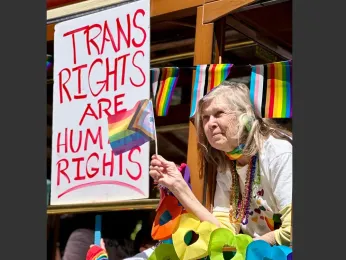
Dealing with bullying
Another area of concern parents will bring up, said Costic, is their LGBTQ child being bullied at school and feeling school officials are not properly addressing the matter. In those instances, the chapter will offer to contact the school counselor or members of the school board on the family’s behalf.
Being in a city with a plethora of LGBTQ nonprofits, Costic noted it is one role the chapter can take on.
“We are a bridge organization between the LGBTQ community and straight allies who want to support the community,” said Costic. “We are an excellent organization to do that.”
The chapter, with an annual budget of $10,000, is all volunteer run and required to pay a yearly fee to the national PFLAG office. Costic told the B.A.R. a goal of his as president is to grow the local chapter’s membership.
His aunt, Beverly Shulman, 68, has been a member since 2021. The San Francisco resident had worked at Macy’s downtown, where she befriended a number of her gay colleagues, and in the 1970s met the late gay supervisor Harvey Milk, then lived through his assassination and only a few years later the lethality of the AIDS epidemic throughout the 1980s. With today’s anti-equality political climate at the federal level, Shulman told the B.A.R. she is again feeling depressed and anxious about where the country is headed.
“It is so depressing what is going on. I can’t believe what is going on in our country,” said Shulman, whose husband is deceased. “This anger and confusion about trans people is just going to spread to other groups.”
The PFLAG chapter’s events provide a counterpoint, said Shulman, offering attendees fellowship with like-minded people. She is looking forward to once again riding on the trolley that is part of its yearly Pride parade contingent.
“It is a way to realize you are not alone and that other people feel the same way,” Shulman told the B.A.R. while attending a sign-making party for the parade that Costic and Mueller hosted in their residential building a few blocks away from the Civic Center where the Pride festival takes place. “It opens up your world.”
Pinkham also plans to march again with the PFLAG contingent. Their oldest child is now in their 30s, earning a Ph.D. this month and moving to Kansas after being hired as a professor at a university in the state. While they have some misgivings about them moving to a red state, Pinkham is comforted by the fact they will be in a liberal college town.
With the trans community coming under particular attack by the federal government, Pinkham told the B.A.R. they need support from the larger community more than ever. Rather than having to wage their own fight for their rights, she said, PFLAG and its members can stand alongside them.
“I just want to make sure my child, whom I love, is growing up free of discrimination … so I feel we, as parents, need to step in and be allies to our kids and be a voice,” she said.
To learn more about joining PFLAG and the San Francisco chapter’s programs, visit its website. It also welcomes anyone to march with its contingent in both the Trans March on June 27 and the Pride parade June 29; visit pflagsf.org/events to sign up to do so.
